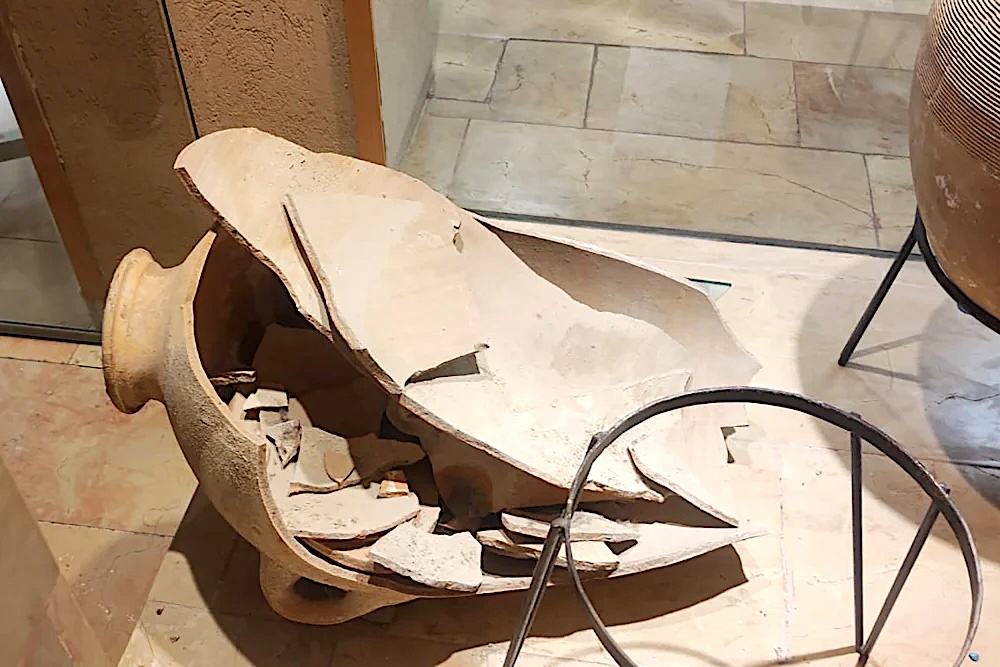Happy ending: Israeli child who broke ancient relic invited back to Haifa museum
A 5-year-old Israeli child who broke a 3,500-year-old jar during a visit to the Hecht Museum in Haifa was invited back to the museum for a special visit with his family.
During an earlier trip to…

A 5-year-old Israeli child who broke a 3,500-year-old jar during a visit to the Hecht Museum in Haifa was invited back to the museum for a special visit with his family.
During an earlier trip to the museum the boy accidentally broke the jar, which dated back to the Bronze Age, between 2200 and 1500 BC.
Dr. Inbal Rivlin, director of the Hecht Museum, told Israeli media the jar had been displayed without a case because of the philosophy of the museum’s founder, Dr. Reuven Hecht, to give visitors, including children, close access to artifacts.
“He said that the museum is not a mausoleum, it is not a coffin, but a living and dynamic place,” explained Rivlin. “The museum is open, for free, to families with children.”
The boy’s father, Alex, explained his son Ariel pulled on the jar slightly to see what was inside, causing the jar to fall to the floor and shatter. Alex recalled the museum was filled with children and he was “shocked” to discover that his son was responsible for the damage.
The father approached museum security guards to inform them of the accident and to offer to pay for damages. “But they called and said it was insured and after they checked the cameras and saw it wasn’t vandalism they invited us back for a make-up visit,” he recounted.
According to All Israel News, after the accident Ariel’s mother, Anna, quickly grabbed the child and removed him from the museum. “It was just a distraction of a second,” she said, “and the next thing I know, it’s a very big boom-boom behind me.”
“I’m embarrassed,” she added, recalling she tried to calm down her son after the mishap. “He told me he just wanted to see what was inside.”
Responded Rivlin: “I would like to tell them: Don’t worry, we have no claim against you. Such events are rare, but they do happen. We will repair the jug and put it back in place in a process called ‘restoration.’ It’s a fascinating process by our restorator, Roy Shapir, that will be captured on video.”
Rivlin said the child and his family were invited back to the museum for “a corrective experience and a guided tour.”
A museum spokesperson told the BBC: “There are instances where display items are intentionally damaged, and such cases are treated with great severity, including involving the police. In this case, however, this was not the situation. The jar was accidentally damaged by a young child visiting the museum, and the response will be accordingly.”
“Families should prepare the children before coming to the museum,” Rivlin added. “Exhibits that are not explicitly stated to allow touching, are not allowed to be touched.”
Rivlin says the museum has plans to use a 3D printer to create clay exhibits especially for children to touch. “All the senses work in children, not just the sense of sight, and they need it,” she says. “We are aware of this need, and we will provide this experience.”
According to the museum most ancient pottery pieces discovered in archaeological excavations in Israel are broken, making the one damaged by the child especially rare because it was discovered intact. The jar had been on display at the Hecht Museum without incident for 35 years.
On the family’s return visit to the museum, Ariel brought along a gift – a clay vase of his own – which was enthusiastically received by the museum’s staff.
“The family was extremely happy and ecstatic to visit Hecht Museum again,” Rivlin said after the return visit. “The guided tour they received from the museum staff and the opportunity to experience the restoration kit first-hand will more than make up for the events of last week.”
Alex, the father, explained to news media the Israeli community of Nahariya, where the family lives, is in an area just south of Israel’s border with Lebanon that has been under rocket fire from Hezbollah for more than 10 months. The family had been visiting museums and taking day trips around Israel throughout the summer in an effort to escape the tensions of war.



